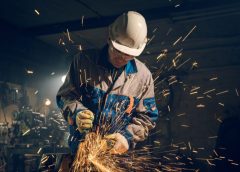Safety features and rules protect metalworkers from injuring themselves and damaging equipment. That said, it’s important to acknowledge good practices. Keep reading to learn about the metalworking safety tips every worker should know.
Always Use Eye Protection
Unfortunately, eye-related injuries are common in workplaces. And the metalworking industry experiences higher rates of eye injuries than other industries. When you’re cutting metals, shrapnel can launch into your eye and damage your cornea. Luckily, specialized eyewear protects workers from shrapnel and other foreign objects that could launch into their eyes.
Don’t Wear Loose-Fitting Clothing
One of the most common rules for metalworking is to avoid loose-fitting clothes. In shops, metal workers use machines with sharp edges, various blades, and lathes. You can easily catch loose-fitting clothes in machines and risk slicing your skin.
Along with clothes, don’t wear accessories or jewelry that can catch onto machines. It’s best to tie back long hair, wear properly fitting gear, and take off accessories.
Use the Right Tools for Tasks
Fabrication shops carry multi-use tools for production. However, some tools aren’t right for metal applications. For example, you shouldn’t use a wood cutting blade for metal because you risk blade fatigue and damage. Metal is stronger than wood, so wood-cutting bandsaws overwork themselves to slice metal materials.
Overworked bandsaws eventually fail and become hazardous for users. Incidents may include electrical shock or fires. Avoid both of these occurrences by using the right tools for tasks!
Keep a Clean Workspace
A clean workspace is a productive workspace. Organize tools and equipment while working on projects. Remove debris and clean up spills. Doing so reduces the chances of slips and falls. After all, you don’t want employees to trip over materials.
Inspect Machines Before Using Them
A major metalworking safety tip that every worker should know is to inspect machines before using them. In particular, inspect the machine’s safeguarding. This is an equipment part that protects workers from bodily injuries.
For example, cutting tools have barriers that prevent workers from touching blades. If the barrier is missing, don’t use the tool.
It’s crucial to take a few minutes to inspect the equipment and ensure it has the right parts! You don’t want to injure yourself or put other employees in harm’s way.
Never Ignore Signs of Trouble
Strange sounds, odd noises, and concerning smells are signs of trouble when operating heavy equipment. If something seems off, pay attention to the signs. A weird smell or sound may indicate machine trouble. You risk injuries or tool damage if you don’t fix equipment or alert people about malfunctions. So stay aware of possible trouble.





